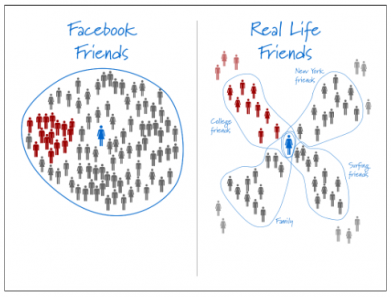
Paul Adams who works on the product team within Facebook, has many great and wonderful thoughts on how and why people share content online. Certainly the experience and knowledge he has from working at Google and now Facebook places him at a wonderful vantage point to see how people use the social networks he has helped to build. He recently gave a talk and outlined many useful ideas and insights that can be utilized in designing for social media and networks.
Most importantly he emphasizes that people don't really share or like things what they are really trying to do is talk. Talking is the foundation on which most social media is really based on and the objects they share and comments they make are merely tools to help start those conversations with others.
So why do people talk?
We talk to make their lives easier. They have am issue and want feedback, they have a thought and want to gather others opinions on the ideas they have.
We talk to build relationships. we have always since early days of tribal living wanted and needed to be part of social groups.
We talk because we like to help others. People usually like to help other people, especially if they have an experience or knowledge that maybe someone else doesn't.
We talk to craft our identities. The things we talk about and the people we talk with help us establish our self identity, and help us gain a great appreciation of who we are what we believe.
Paul mentions that people don't like and comment on social sites because they have a deep liking for the link or statement someone has made, but because they actually like the people behind the information. People look for commonality among others in their groups, jokes and humorous uploads can help see a match with like minded individuals. Most conversations we have are part of our reputation management, conversations help us define who we are.
Talking requires good listening and response. Today's conversations online are mostly what Paul calls Lightweight interactions and especially companies should be having many lightweight interactions with their customers. Talking and conversations are much more natural and long lasting into the future if they last for shorter periods of time but more frequently. The days of having deep and meaningful conversations are becoming rarer in our always connected world.
So who do we talk to? We mostly talk to people just like ourselves. People we have strong ties with. Most people Paul suggests have 4 small independent groups, in which 80% of the conversations are with the same 4-5 people. We are most influenced by the people we are closest to. People in each group are very similar to the person at the center of the social circle. Things that are interesting to friend in one group, will most likely be interesting to another group in your social sphere

So what do people talk about?
Personal experiences. 70% of talk is about this. This is one reason to build experiences around brands, it gives people more to add to their daily conversations.
People talk about other people. Not always in a bad way, but as part of what makes our lives, interacting with others. These form social norms, and gossip can help teach us how to behave with each other.
We talk about what's around us. Stuff in our Worlds, and in our current environment.
We prefer to talk about feelings not facts. We like to tell emotional stories.
So if you plan to build a social network or site that always social grouping and talking Paul suggests the following considerations as among the most important.
Why: Help people build relationships
How: Create lightweight interactions over time.
Who: Optimize for strong ties
What: Feelings not facts.

